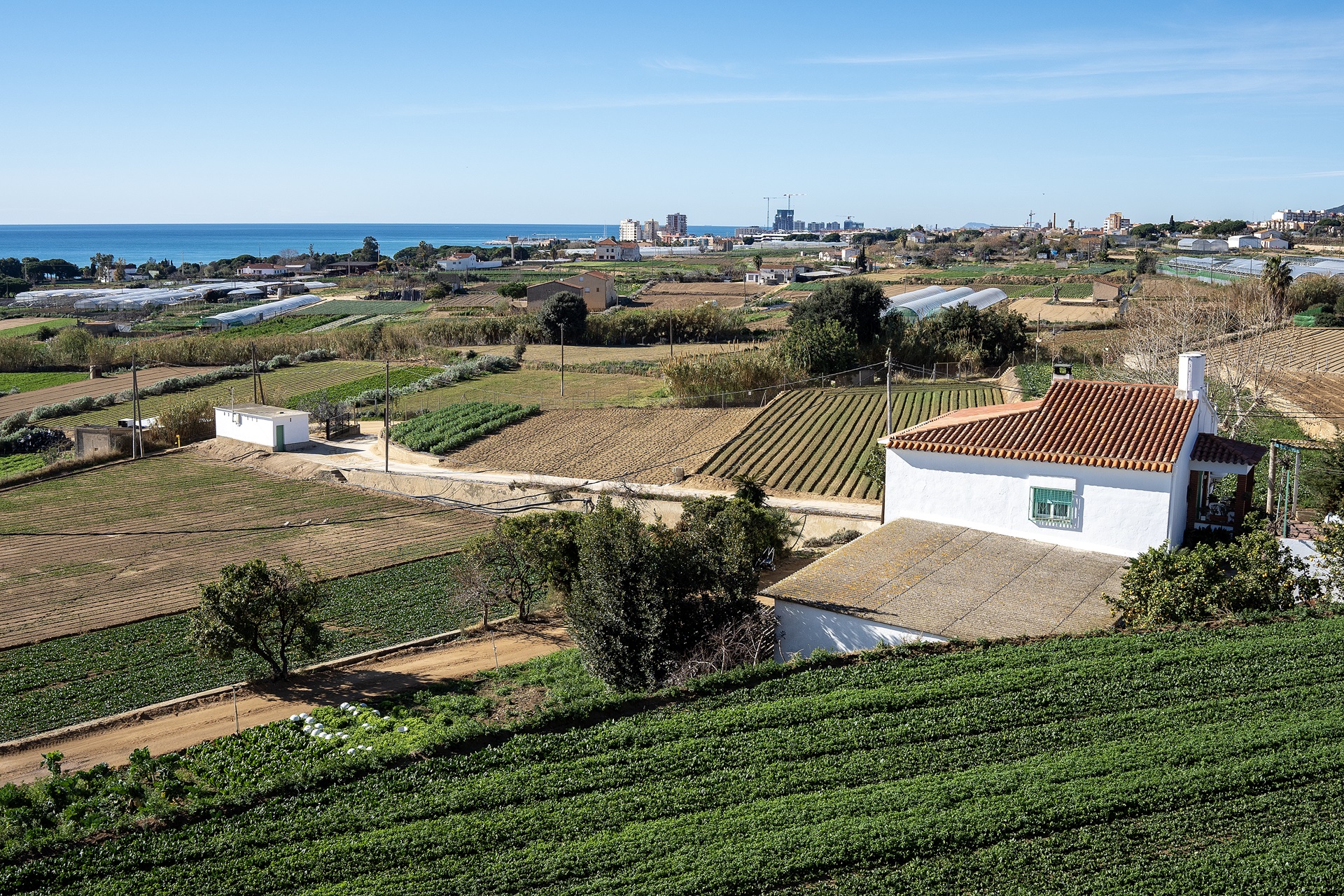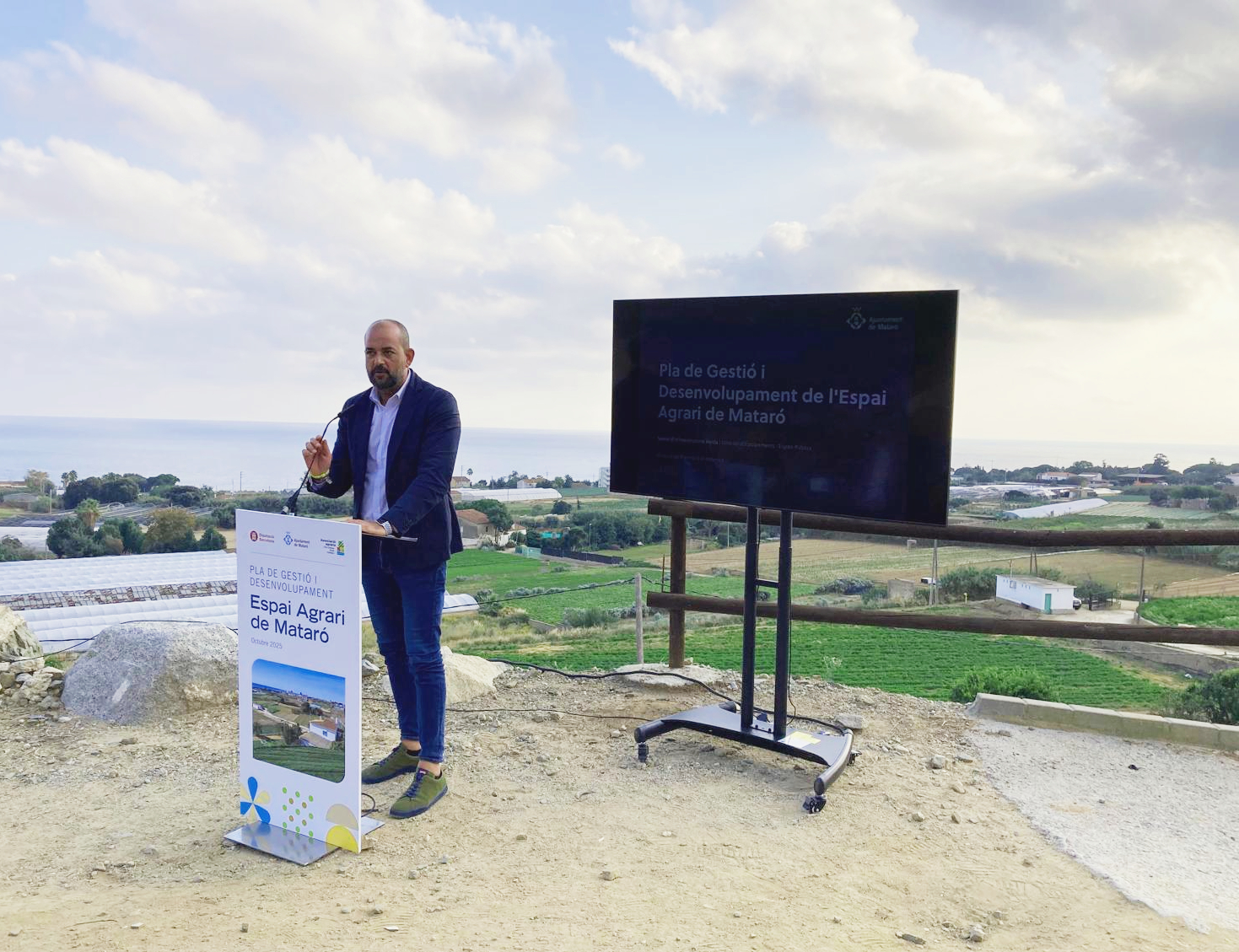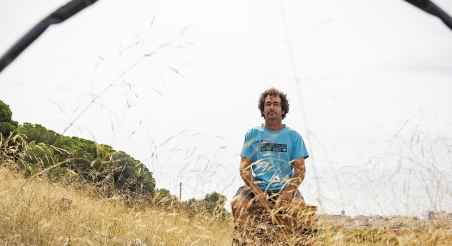Coinciding with World Food Day, the Management and Development Plan for Mataró Agricultural Area was presented on Thursday, 16 October at Les Cinc Sènies. This strategic governance and management document aims to protect and revitalise one of the most distinctive peri-urban agricultural areas on the Catalan coast: 783 hectares of agricultural land situated between Montnegre i el Corredor Natural Park and the seafront of the capital of Maresme county.
The result of a diagnostic study and participatory process with local stakeholders, the Plan has been funded and technically supported by Barcelona Provincial Council within the framework of the Barcelona Agraria programme. This initiative forms part of the Council's commitment to preserving peri-urban agricultural land and strengthening the primary sector as a key element of green infrastructure and territorial food sovereignty.
Inter-institutional collaboration
The presentation event was attended by the Catalan Government Minister for Agriculture, Livestock, Fisheries and Food, Òscar Ordeig; the Barcelona Provincial Council Deputy for Natural Areas and Green Infrastructure, Xesco Gomar; the Mayor of Mataró, David Bote; and the Mataró Councillor for Agricultural Areas, José Antonio Ricis. The presence of these four officials demonstrates the commitment to inter-institutional collaboration in promoting local and sustainable agriculture.
Deputy Xesco Gomar emphasised that "public administrations have an obligation to align ourselves and invest in agricultural areas, doing so whilst taking into account their complex and diverse needs to ensure that people can access quality food". He added that "consuming local produce is not only about consuming quality, but also about life for future generations, who we hope will be able to feed themselves with these products for many years to come and will be able to live with and from farming".
For his part, Minister Òscar Ordeig stated that "we must work together to restore the balance between urban and agricultural space, a balance that has unfortunately been broken", and highlighted the need to enhance training on the food production value chain, manage agricultural areas, promote joint marketing platforms without intermediaries, and establish alliances between the primary sector, catering and gastronomy to showcase local produce and the Mediterranean diet.
Six areas, approximately 60 actions
The Management and Development Plan for Mataró Agricultural Area structures its implementation across six areas with around 60 actions aimed at consolidating professional agricultural production. The strategy also connects local agriculture with urban health, environmental balance and food sovereignty, whilst strengthening links between citizens and the farming community. These initiatives address the challenges of the climate crisis, ageing within the primary sector, loss of biodiversity and current threats to the food sector economy, whilst simultaneously reinforcing agriculture's role as a provider of ecosystem services.
Regarding land, the Plan envisages actions to improve water resources, particularly drainage and irrigation system efficiency. The land bank will also be strengthened to encourage generational renewal, inappropriate uses of agricultural space will be eliminated, understorey grazing will be enabled and productive use of woodlands developed, alongside promoting composting, amongst other actions.
Regarding the profession, interventions are designed to consolidate the farming profession by facilitating generational and business succession, recognising and showcasing women farmers' work, and providing training, technical support, research, experimentation and advisory services to the agricultural sector.
The product area includes creating a community workshop and continuing the «Collits a Casa» brand, already well-established in the territory. The Plan also includes actions against food waste, increased presence in markets and points of sale, promotion of traditional varieties, encouragement of cut flowers and ornamental plants, obtaining «Vil·la Florida» certification and new advances in the local Food Plan.
The citizenship, governance and communication sections envisage strengthening citizen participation, cross-cutting collaboration between different municipal departments and supra-municipal administrations, and disseminating actions through workshops, training courses and the Festival Dos Terços.
Five years of political and social consensus
The publication and presentation of the Management and Development Plan for Mataró Agricultural Area culminates a process begun in 2020 with the approval of the Institutional Declaration for the preservation, improvement, development and management of the Cinc Sènies-Mata-Valldeix Agricultural Area. In 2021, a collaboration agreement was signed with the Associació Agrària to establish a joint working framework; in 2022, the Taula de l'Espai Agrari was established as a shared governance body to ensure transversal and effective management; in 2023, the Carta Alimentària de Mataró was approved; and in 2024, the Institutional Declaration «Mataró, Ciutat Agrourbana» was approved, recognising agriculture as a strategic municipal asset.
The Plan forms part of the Mataró 2030 Urban Agenda, specifically within the Mataró Pròspera area.
10 agricultural areas and parks supported by Barcelona Provincial Council
Mataró Agricultural Area is one of 10 agricultural areas and parks with signed agreements that the Barcelona Provincial Council is promoting with a strategic territorial vision. Together, they cover 65 municipalities and 112.368 hectares of agricultural land, benefiting 1.733.425 people.
Agricultural areas and parks are specialised areas for local agri-food production and, simultaneously, providers of essential ecosystem services. They supply food, regulate environmental processes, generate economic opportunities and offer cultural, identity-based and landscape values that enrich and strengthen the territory and society.
Integrated into the provincial green infrastructure, these agricultural areas and parks contribute to water cycle regulation, biodiversity conservation and climate change mitigation. Their management seeks to preserve, promote and diversify agricultural and livestock activity, guaranteeing its continuity, viability and adaptation to current challenges. They also facilitate access to local produce and promote its consumption, thereby fostering a closer relationship between citizens and the primary sector.
Data on the 10 agricultural areas and parks supported by the Barcelona Provincial Council can be consulted on this interactive map.




